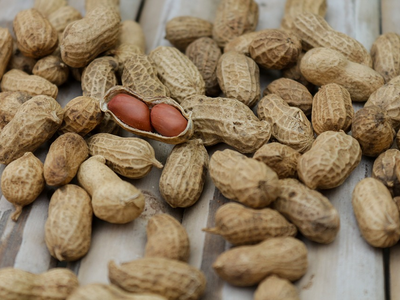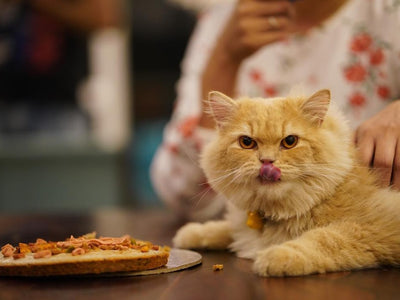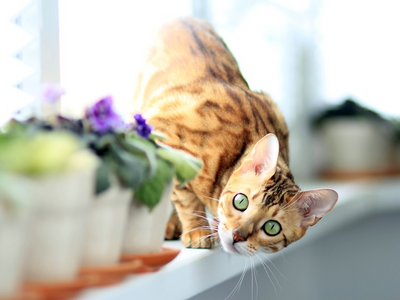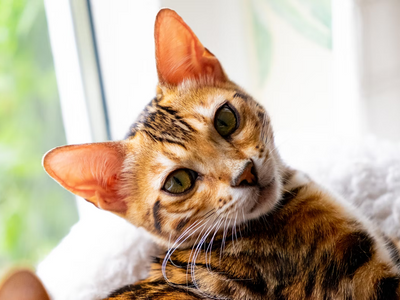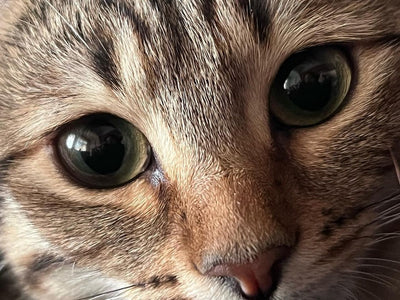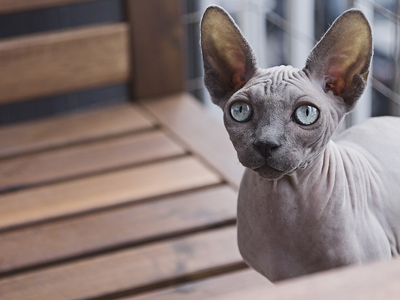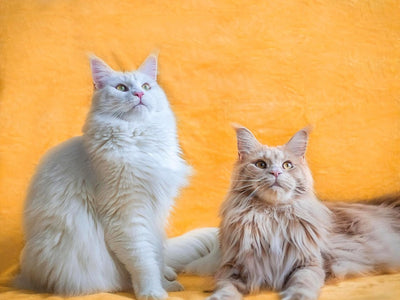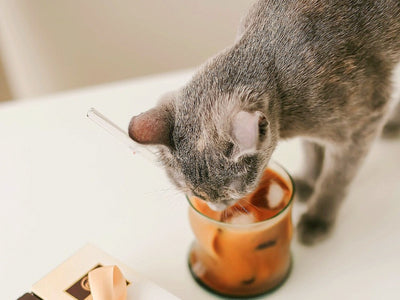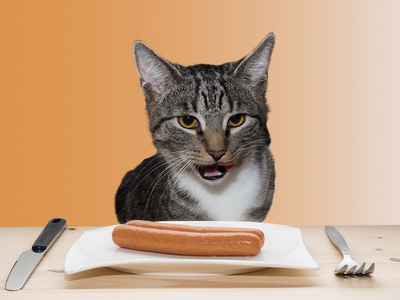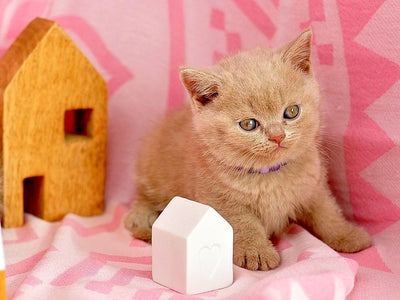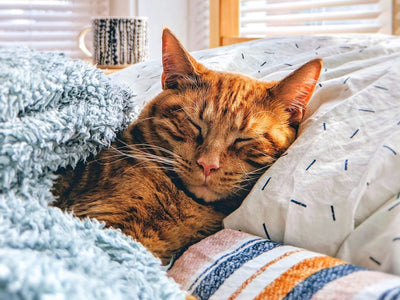01.05.2022
Can cats eat sugar? Feline nutrition facts from Untamed with no sugar coating!
Can cats eat sugar? The short answer is—kind of. The feline’s carnivorous nature affects the way they process particular nutrients. Cats have no biological need for carbs, and even their ability to taste sugar is limited (your pet is practically “sweet blind”).
So, what happens when cats and sugar mix? In this article, we’ll discuss the potential health concerns of a high-carb diet and single out the sugary foods and drinks felines shouldn’t eat.
Is sugar bad for cats?
As obligate carnivores, cats don’t have much of a sweet tooth. Your pet’s natural diet consists of protein, fat, and other nutrients they’d normally harness from freshly killed prey.
Like most carbohydrates, sugar isn’t toxic to cats but shouldn’t exceed 3% of their daily meals. The feline’s metabolism is biologically adapted to a meat-based diet, so it has a limited capacity to process carbs. Feeding your cat sugar every day can put them at risk of developing:
- Digestive problems
- Obesity
- Diabetes mellitus
Digestive problems

Why’d you let me eat berries and cream?
Source: @micanzy
Too many carbs in your cat’s meals can overwhelm their digestive system, mainly the stomach, small intestine, and pancreas. Felines don’t have the enzymes necessary for efficient carbohydrate digestion, so eating sugar can cause gastrointestinal discomfort.
Depending on the amount of sugar your pet devoured, they can experience flatulence, vomiting, diarrhoea, and similar symptoms of indigestion.
Most cats will negatively react to binge-eating sweets, but some felines are more susceptible to digestive problems, namely:
- Cats with chronic GI disease—Felines suffering from irritable syndrome (IBS), colitis, gastritis, or frequent constipation shouldn’t eat sugary foods
- Kittens and elderly felines—Kittens and senior cats have a limited capacity to digest certain foods, including sugar, because of their sensitive stomachs
- Cats with a genetic predisposition for digestive disorders—Particular breeds, like the Sphynx and Ragdoll cat, have a genetic predisposition for gastrointestinal disease, so they should avoid irritable ingredients
Obesity
While cats can experience the so-called sugar rush, the energy boost is short. Felines don’t need carbs to feel lively because their primary energy source is animal protein.
Nutrients that aren’t harnessed for energy purposes create a calorie surplus. Since the average indoor cat is somewhat inactive, they shouldn’t go over the recommended daily intake (40 calories per kilo of body weight), or they might start piling on pounds.
Feline obesity is a growing concern in the UK, with approximately one-third of cats being overweight, according to the People's Dispensary for Sick Animals (PDSA). The nutritional disorder can provoke additional health problems, such as
- Diabetes mellitus
- Urinary inflammation and bladder stones
- Liver failure
- Cardiovascular disease
You should encourage your pampered pet to exercise and ensure they don’t eat more calories than advised. Try to remove sugar and other nutrients that have no biological value from their daily meals.
If you have a breed prone to obesity, like a Maine Coon or Persian, keep track of their weight with the body condition score chart.

Yeah, sure, I’ll start a diet…tomorrow.
Source: @kes_the_cat
Diabetes mellitus
Diabetes mellitus is a common metabolic disorder among indoor cats. The exact cause is still relatively unknown, but it’s mostly attributed to genetics and nutritional imbalances. Other risk factors include:
- Obesity
- Insulin-resistance disorders (e.g. hyperthyroidism or pancreatitis)
- Decreased physical activity
Does that mean sugar and cats equal diabetes? Possibly. Studies have shown that felines have lowered glucokinase (GCK) activity in their liver and pancreas. The enzyme acts as a “glucose sensor,” and cats have a limited ability to regulate blood sugar levels without it. A high-carb diet can contribute to the onset of type II diabetes, especially in breeds with a propensity for it, like Russian Blue, Burmese, and Siamese cats.
What type of cat food is low in carbs?
High-quality wet food is much closer to your cat’s natural diet in terms of nutritional properties. Both semi-moist and moist recipes are typically low in carbs and:
- High in moisture—The average moisture content for most wet food products is 70% per serving. Your cat needs water to harness the nutrients from their meals and keep the blood pumping. Without proper hydration, felines can suffer from digestive disorders, urinary inflammations, and chronic fatigue
- Protein-dense—Cats need more protein than dogs and other omnivores to remain healthy. The nutrient enables amino acid (most importantly taurine) synthesis, muscle growth, tissue formation, and vital bodily function. Without enough protein in their diet, cats can develop metabolic anomalies, chronic disease, and muscle wasting. Most wet food products have more than 50% animal protein, which fits your pet’s nutritional and energetic requirements
Another advantage of wet cat food is its versatility. The recipes can come in various textures, including:
If your cat ever gets bored with their regular meals, you can always shake things up by switching between different types of wet food.
Does kibble contain sugar?
Kibble contains 25% of carbohydrates on average, so it’s a high-calorie food. The total sugar content depends on the amount of starch in a particular product.
While dry food contains meat, it also includes various plant-based ingredients, such as:
- Corn gluten meal
- Soybean meal
- Wheat flour
- Brewers rice
Vegetable meals and starches can’t fulfil your cat’s nutritional requirements because animal tissue is the only viable protein source. Since felines don’t use carbs for energy, what’s left is a calorie surplus.
Does that mean kibble is bad for your pet? Dry food is still palatable, digestible, and safe for cats even with the excess carbs. You can serve it in moderation, ideally as a side dish to wet meals.
Untamed cat food—sugar-free and protein-packed!
Untamed food mimics the natural feeding pattern of wild cats. Instead of mice and game, we use whole meat naturally rich in protein. Our recipes are entirely sugar-free because we don’t add grain fillers or starchy vegetables for bulk.
If you switch to our premium cat food, your cat will get nourishing meals that are:
- High in protein—A single serving of Untamed food has twice the amount of animal protein as the industry standard
- Made with whole meat—The poultry, fish, and seafood we use in our products are of human-grade quality
- Vet-formulated—We formulated each recipe in collaboration with vets to cater to your cat’s unique biology
- Ethically produced—Our company is 100% Carbon Neutral Certified
- Fussy eater approved—Untamed food is irresistible to cats of all ages and breeds
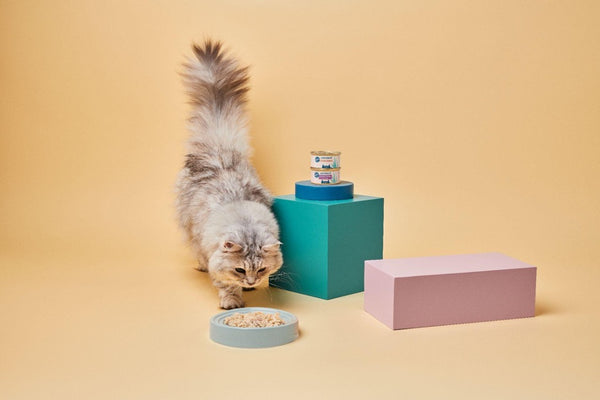
The appetising aroma of Untamed food is bound to pique your picky eater's interest!
Image (c) Untamed
Each feline delicacy is gently steamed to increase the bioavailability of the final product. The entire production process is fine-tuned to deliver nutritious and tasty meals that benefit your cat’s health. Many members of the Untamed community have noticed the following perks of switching to our food:
|
Timeline |
Health benefits |
|
Within a week |
|
|
After two months |
|
|
Within four months |
|
|
Life-long benefits |
|
Check out our versatile menu
We offer an exciting variety of recipes made with:
- Chicken breast
- Chicken liver
- Duck breast
- Salmon fillet
- Tuna steak
- Sardine and mackerel fillet
You can take our TRY NOW online quiz to create a customised meal plan for your cat! Fill us in on their food preferences, allergies, and life stage, and pick the perfect combo of Untamed products.
If you’d like to learn more about our exciting menu, check out the table below:
|
Our menu |
Details |
|
Chocka Chicken in Jelly* |
Premium chicken breast dipped in mouth-watering jelly |
|
Chocka Chicken with Duck in Jelly |
Fresh chicken spiced up with delicious duck meat, served in jelly |
|
Chocka Chicken with Ham in Gravy |
Juicy chicken breast gently cooked in natural chicken gravy with a hint of ham |
|
Chocka Chicken in Gravy* |
Shredded chicken breast simmered in natural gravy |
|
Tuck-in Tuna in Jelly* |
Dolphin-safe tuna steak in jelly and appetising fish broth |
|
Tuck-in Tuna with Salmon in Jelly |
Tuna steak in jelly complemented with high-quality salmon fillet |
|
Tuck-in Tuna with Shrimp in Jelly |
Dolphin-safe tuna served in jelly with delicious shrimp |
*Chocka Chicken and Tuck-in Tuna are specially designed for the more sensitive kitty. Each hypoallergenic recipe is made with a single source of protein.

Chocka Chicken in Jelly is our single-protein-source recipe.
Image (c) Untamed
Create a customised meal box for your pet
Do you want to become a member of our wild bunch? Sign up for a starter pack and create your first tailor-made meal box for your kitty online! Follow these steps:
- Visit our TRY NOW page
- Give us the deets about your cat
- Select a meal plan
- Place your order if everything checks out
Your trial pack will arrive fresh on your doorstep within a day. And when we say we deliver fresh cat food—we mean it! Untamed food comes ready-to-serve, so no additional preparation is required on your part. All you have to do is pop the lid and wish your cat “bon appétit.”
Which sugary foods are dangerous to cats?
While cats can enjoy small amounts of sugar from time to time, you need to be careful when choosing which “sweets” to serve them. Some high-carb foods are best kept off your pet’s plate, namely:
- Citrus fruit—Citruses have between one and six grams of monosaccharides per piece, but the sugar content isn’t the main concern. The fruits have high amounts of citric acid and essential oils in the flesh and rinds, both of which are highly toxic to cats. A small bite of orange can give your pet an upset stomach, while merely touching the fruit can cause allergic dermatitis in more sensitive breeds
- Grapes—One cup of grapes contains 100 calories on average and almost 24 grams of sucrose, fructose, and glucose. The sugary fruits are highly toxic to cats for reasons yet to be confirmed. It could be the presence of fungal toxins and tartaric acid that causes toxicosis
- Alcohol—The sugar content in alcohol can vary depending on the type (e.g. chocolate liquor has around 46 grams of sugar, while vodka has virtually none). Ethanol poisoning can have serious consequences on your cat. The stimulative substance affects the feline’s nervous system, inducing vertigo, muscle tremors, seizures, and, in some cases, coma
- Milk—Most cats struggle to digest milk sugar, i.e. lactose in dairy products. The intolerance entails acute digestive problems (e.g. flatulence, vomiting, diarrhoea, and bloating) that can last up to 48 hours. Vegan milk replacers, such as soya milk, are also too sweet for the carnivorous cat
Should cats eat foods containing refined sugar?
Unlike natural sugar in fruits, veggies, and grain, refined sugar is heavily processed, which further decreases its nutritional value. Cats can handle a certain amount of digestible carbs, but artificial sweeteners and table sugar should be off the table. Refined sugar is commonly found in:
- Chocolate and confectionery
- Peanut butter and sweet spreads
- Pasta, tortillas, bread, pastries, and other cereal-based foods
- Mayonnaise, ketchup, and other condiments
- Tomato sauce and salad dressings
Check out our other guides to what cats can or cannot eat:
|
|

![Associated image for What human food can Sphynx cats eat? [Comprehensive list]](http://untamed.com/cdn/shop/articles/what_human_food_can_sphynx_cats_eat_Featured_400x300_crop_center.jpg?v=1648705074)
